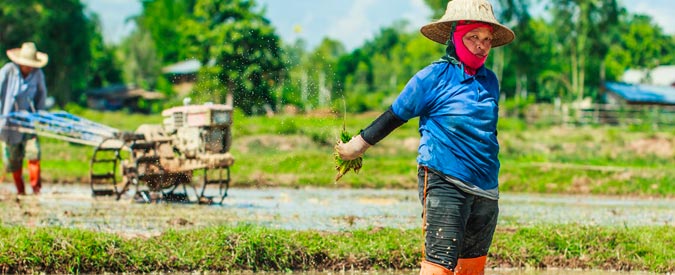
Preparing for the COP21 in Paris – Women and Access to Technology
At the twenty-first Conference of Parties to the United Nations discussions will also focus on the importance of access to technology as an instrument in the quest to legitimize women and the fight against climate change.
Like most African countries, every year the Republic of Benin faces a long dry season which exposes a substantial part of its population to the risk of malnutrition. Water is present in the area, but mainly in underground aquifers. Access to these water resources therefore requires pumping systems. However, electricity, which is the energy source most frequently used to supply power to motors, reaches only a limited part of the rural areas. This is the setting of the intervention carried out by the Solar Electric Light Fund (SELF), an American non-profit association which in 2006 launched a plan to provide electricity to the district of Kalalé through the use of solar energy.
Thanks to the introduction of solar panels the local communities have been able to access a source of energy having a low environmental impact for a variety of uses, starting with food production, which is a fundamental activity in the regions at risk of desertification. Those cooperating with the SELF have been able to verify the effectiveness of a gender approach involving women, who are responsible almost exclusively for the food chain, with the development of an intervention plan that takes into account their daily experience in the fields and in the domestic sphere. In 2007, the organization thus created the Solar Market Garden (SMG), a pumping and water-supply system for irrigation, developed thanks to the key observations of the female members of the community.
The promotion of technologies suitable for the territory is crucial if we want developing countries to experience a process of economic and social growth without neglecting environmental protection. At the COP21 session in Paris discussions will deal with the way in which it will be possible to make these technologies accessible through international funding and action plans implemented with the cooperation of countries that will benefit from them. However, the point that is likely to be overlooked is once again a consideration of the gender perspective. In fact, one of the many forms of discrimination that women face in underdeveloped nations is their preconceived exclusion from the process of technological innovation. Experience has shown that the success of humanitarian intervention also depends on this, and the expectation is that the Conference of the Parties in Paris will make a significant step forward on this particular front of gender rights.
The Solar Market Garden is an example. The system was installed in the villages of Dunkassa and Besassi. The women of these communities have formed ‘collective farms’ for the management of kitchen gardens and irrigation systems. Following the innovation in both villages fruit and vegetable production has reached levels exceeding food-emergency requirements. The Solar Market Garden has also helped women in other aspects of their daily life. In the first place, reducing their commitment in terms of time and physical effort so as to allow for the performance of other activities, starting from the sale of surplus products. Secondly, freeing them wherever possible from agricultural duties. The system, in fact, has an operational range of autonomy of three days, during which women can engage in occasional activities with consequent personal and community benefits. The results have not been slow to emerge: from the return to school of children of families no longer able to afford such an expense to access to health care out of the reach of the more modest economic realities and even the start-up of business activities which, albeit quite simple, mark the beginning of real social progress.
In the wake of these early successes, the Solar Electric Fund has extended to other areas of Benin the installation of solar energy systems for the development of rural communities with action that is still ongoing. The Solar Market Garden in particular has been proposed once again as a model for the development and the strengthening of the role of women. Its positive results would moreover suggest the possibility of exporting this ‘gender sensitive’ approach to other parts of the world.
Chiara Soletti
Published for Italian Climate Network on the association’s website.
